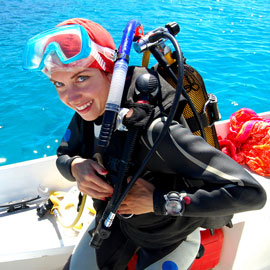Get Ready for Boat Diving
Posted: Dec 24 in Dive Blog tagged Specialty Diving by JanAfter scuba certification in Illinois, use these tips to make every boat diving experience safe and enjoyable

Though scuba certification makes it possible to explore incredible places, in most cases you’ll need another form of transportation to get to your dive site. Unless you plan to spend all of your time diving quarries, this will mean spending a significant amount of time in a dive boat.
Whether the dive boat you’re embarking on is a tiny dinghy, a 6 pack or a multi-diver behemoth, following a few simple rules will make things easier for you and the crew. While you can take advantage of our boat diver specialty class to learn all there is to know about diving from different kinds of boats, the tips below can help you be a perfectly polite and well-prepared boat diver on any excursion.
Pack light.
Dive boats typically have very limited room and may be crowded with other divers. This means you’ll need to avoid bringing anything inessential that may clog up space. Be sure that you have everything you need, but don’t do so at the expense of other divers. It’s a good idea to have a bag used exclusively for bringing gear on and off the dive boat—any unused gear should be easily storable and the bag should be able to handle getting wet.
Stick to your spot.
Generally, you’ll be assigned to a specific spot with a scuba tank and room for storage. Secure your tank and keep all your gear (and yourself) in that area to avoid stepping on anyone’s toes. Remember: everyone needs a little elbow room, especially when preparing for a dive! Your starting spot will likely be where you return to after a dive as well. After your dive, change tanks quickly and keep all your gear neatly stowed to avoid tripping other divers trying to get back to their spots. Always check and double check that you remembered to secure both tanks after swapping them out between dives.
Listen to the crew.
The crew is there to help you make your dive experience as enjoyable as possible—follow their instructions closely. There will likely be a briefing before the dive begins and paying attention to it will help you make the most of your dive. Entry and exit instructions can change dramatically in different spots, so be sure to listen to them every time and take note of changing surface conditions. If you have any doubts, don’t hesitate to ask questions—the crew may not know if you need a hand or have a question.
Boat diving is a simple task after getting your scuba certification, but that doesn’t mean you should go into it unprepared. Do you have any other valuable tips for boat diving? Share your experiences in the comments below!
